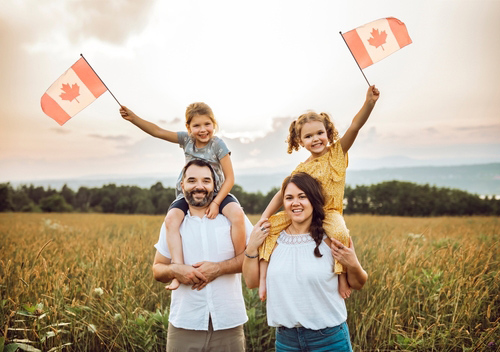

Sponsoring your family in Canada is a great step toward family reunion and building a new life together in a country known for its inclusivity. However, not everyone can sponsor their loved ones, and not every relative is eligible for family sponsorship.
You are eligible for sponsorship if you are at least 18 years of age and meet any one of the following listed below:
Furthermore, other requirements may be needed depending on the specific program you are applying to.
Let us see various sponsorship programs for different types of relatives.
Canada welcomes around 80,000 family-class immigrants under its Spouses, Partners, and Children category. As a Canadian resident or citizen, The federal government allows you to bring your spouse or partner and become a permanent resident of Canada.
To sponsor your foreign spouse/partner, you must prove that your relationship is genuine and fits into either of the three categories below:
You can sponsor your same-sex partner as Canadian law recognizes that relationship as genuine. However, both must meet all the eligibility criteria set by IRCC.
Sponsoring a spouse/partner in Canada involves financially supporting the sponsored person for three years. They must not avail themselves of any social benefits from the government. Nor should they be declared bankrupt. Furthermore, you must sign an undertaking proving that you will meet the basic needs of the sponsored person. The basic needs include the following:
You may need to remit various fees to sponsor your spouse/partner. These include sponsorship fees, principal applicant processing fees, and biometrics (fingerprints and photos). The total cost may be approximately CAD1200 plus. You may check the official website for the latest information.
Your sponsored person can live, study or work in Canada as per the immigration policies.
You have two main options when sponsoring:
Outland Sponsorship
The sponsor must reside in Canada, and the sponsored person can reside abroad. Throughout the application process, the sponsor must be in Canada, while the sponsored person may freely travel to and from Canada with a visa-free passport or a Canadian visa.
Inland Sponsorship
During the sponsorship application, both parties must reside in Canada. The spouse/partner must have a temporary resident visa status, such as a student, worker, or visitor. They are also eligible to work under an Open Work Permit (OWP) so that they, as a family, won’t face too much of a financial burden.
The dependent child sponsorship program allows Canadian citizens and permanent residents to bring their child from their home country to Canada. This program comes under Family Class Sponsorship.
Whether they are biological or adopted children, parents can sponsor them and live together in Canada.
Once your child turns 22, you cannot sponsor them, so applying before this age becomes crucial.
The whole process of applying can be divided into two:
Canadian citizens and permanent residents can bring and live with their parents and grandparents through the Parents and Grandparents Program (PGP).
The PGP runs annually using a lottery system.
This allows them to reunite with their families in Canada and access the full range of social benefits available to permanent residents.
Apart from PGP, you may opt for a Supervisa to sponsor your parents and grandparents. A supervisa is a multiple-entry visa that permits your sponsored persons to stay up to five years in Canada. During this period, there is no need to renew the visa.
The validity of this visa is up to ten years, allowing the sponsored person to enjoy and experience Canadian life.
Unlike PGP, Super-Visa has the fastest processing time and that too you may get approval within weeks. The whole process of family reunion requires less amount of time.
However, unlike PGP, a Supervisa doesn’t lead to permanent residency and instead offers longer stays without frequent renewals.
You may sponsor your siblings, nephews, nieces or grandchildren if they meet the following criteria:
However, you cannot sponsor if:
In addition, Canadian citizens or permanent residents can sponsor other relatives under specific conditions.
To qualify, the sponsor must have no other living relatives they could potentially sponsor, such as a:
Moreover, the sponsor must not have any other relatives, such as an aunt or uncle, who are:
If the relative you want to sponsor has a spouse, partner, or dependent children who will accompany them to Canada, they must be included in the same sponsorship application.
You cannot sponsor a person who is inadmissible to Canada under the immigration law. If you are not allowed to enter Canada due to inadmissibility, you will not be permitted to enter the country.
However, in certain cases, you may be issued a temporary resident permit. If you have a criminal record, options are available to address your inadmissibility.
Entry into Canada may be denied for various reasons, including concerns related to security, criminal history, or medical conditions. You may need to check for the reasons and may consult a good immigration lawyer to overcome the inadmissibility.
At ImmiLaw Immigration, we have proficient immigration lawyers and overseas study experts who can assist you through every step to ensure a smooth migration to Canada. We understand the challenges you may face during the immigration process of your dear and near ones.
You may contact us for any personalized assistance tailored to your needs.